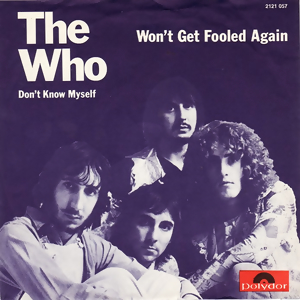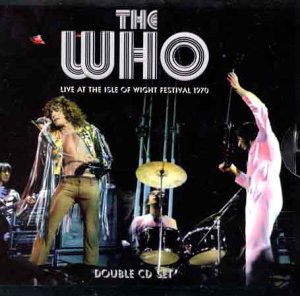
Who's Next is the fifth studio album by English rock band the Who. It developed from the aborted Lifehouse project, a multi-media rock opera written by the group's guitarist Pete Townshend as a follow-up to the band's 1969 album Tommy. The project was cancelled owing to its complexity and to conflicts with Kit Lambert, the band's manager, but the group salvaged some of the songs, without the connecting story elements, to release as their next album. Eight of the nine songs on Who's Next were from Lifehouse, the lone exception being the John Entwistle-penned "My Wife". Ultimately, the remaining Lifehouse tracks would all be released on other albums throughout the next decade.

Live at Leeds is the first live album by English rock band The Who. It was recorded at the University of Leeds Refectory on 14 February 1970, and is their only live album that was released while the group were still actively recording and performing with their best-known line-up of Roger Daltrey, Pete Townshend, John Entwistle and Keith Moon.
Lifehouse is an unfinished science fiction rock opera by the Who intended as a follow-up to Tommy. It was abandoned as a rock opera in favour of creating the traditional rock album Who's Next, though its songs would appear on various albums and singles by the Who, as well as Pete Townshend's solo albums. In 1978, aspects of the Lifehouse project were revisited by the Who on Who Are You. In 2000, Townshend revived the Lifehouse concept with his set Lifehouse Chronicles and the sampler Lifehouse Elements. On 1 May 2007, he released an online software called The Lifehouse Method in which any "sitter" could create a musical "portrait". The site is now defunct.

Lifehouse Chronicles is a box set released in 2000 by Pete Townshend with the focus of the box being the formerly "abandoned" Lifehouse rock opera. The set contains song demos by Pete Townshend; including solo versions of "Baba O'Riley", "Won't Get Fooled Again", and "Who Are You", and the Lifehouse Radio Program. The box set release was followed by two Sadler's Wells Lifehouse concerts and the release of a live CD and video/DVD titled, respectively, Pete Townshend Live: Sadler's Wells 2000 and Pete Townshend – Music from Lifehouse.

"Baba O'Riley", also erroneously referred to as its chorus refrain "Teenage Wasteland", is a song by the English rock band the Who and the opening track to their studio album Who's Next. It was issued in Europe as a single on 23 October 1971, coupled with "My Wife".

Odds & Sods is an album that consists of studio outtakes and rarities by British rock band the Who released by Track Records in the UK and Track/MCA in the US in 1974. It is notable as being one of the first and earliest examples of "rarities" compilations.

"Won't Get Fooled Again" is a song by the English rock band the Who, written by Pete Townshend. It was released as a single in June 1971, reaching the top 10 in the UK, while the full eight-and-a-half-minute version appears as the final track on the band's 1971 album Who's Next, released that August.

Live at the Isle of Wight Festival is a double live album by The Who, recorded at the Isle of Wight Festival on 29 August 1970, and released in 1996. A DVD of the concert was also released for the first time in 1996.

"5:15" is a song written by Pete Townshend of British rock band The Who. Part of the band's second rock opera, Quadrophenia (1973), the song was also released as a single and reached No. 20 on the UK Singles Chart, while the 1979 re-release reached No. 45 on the Billboard Hot 100.

"Zoot Suit" b/w "I'm the Face" was the first single of the British rock band the Who, who recorded it under the name the High Numbers in an attempt to appeal to a mod audience. "Zoot Suit" was written by Peter Meaden, the band's first manager. The song is a direct copy of "Misery" by the American R&B group the Dynamics, while the B-side, "I'm the Face", is a copy of Slim Harpo's "I Got Love If You Want It." The single was meant for a mod audience, but failed to chart. The band changed their name back to The Who, found new management, and released their own composition "I Can't Explain", which became a top ten hit in the United Kingdom.
"Love Ain't for Keeping" is a song written by Pete Townshend and originally released by the Who on their 1971 album Who's Next. Its themes include the joy of physical love, the power of nature and the need to live for the moment.
Rock Is Dead—Long Live Rock was the title of an unreleased 1972 autobiographical album by the British rock band The Who. In the liner notes for the Who's 1974 rarities collection Odds & Sods, guitarist and lead songwriter Pete Townshend said, "I had an idea once for a new album about the history of The Who called Rock Is Dead—Long Live Rock. That idea later blossomed into Quadrophenia." The sessions for the album spanned from 19 May to 6 June at Olympic Studios in London. Rock Is Dead—Long Live Rock was to be produced by The Who and Glyn Johns and scheduled for release in October 1972, but although the album was nearly completed the band felt as though it sounded too much like their 1971 LP Who's Next. Townshend later stated that Rock Is Dead—Long Live Rock was also going to be a TV special about The Who.

"Real Good Looking Boy" is a song written by the guitarist of the British rock band The Who, Pete Townshend. It was originally released in 2004 on the compilation album Then and Now, and was one of two new songs on that album, the other being "Old Red Wine". Together, they were the first new songs released by the Who for 15 years. It was later released as an edited single backed with the aforementioned song. "Real Good Looking Boy" was later performed in the 2007 rock musical The Boy Who Heard Music. The song peaked at #28 on the Heritage rock chart. Bassist Greg Lake and drummer Zak Starkey, as well as keyboardist John "Rabbit" Bundrick played on this song.

"Long Live Rock" is a 1972 single by The Who, written by Pete Townshend. A different version of the song was performed by Billy Fury's character in the film That'll Be the Day.

"Join Together" is a song by British rock band The Who, first released as a non-album single in May 1972. The song has since been performed live multiple times and has appeared on numerous compilation albums.

Amazing Journey: The Story of The Who is a compilation of songs featured in the documentary of the same name. This soundtrack was only released in Best Buy stores in the United States.
The Who Tour 2000 was partially in support of The Who's live album The Blues to the Bush and their first full-fledged tour as a five-piece band since The Who Tour 1982.

"Relay" is a song written by Pete Townshend, the guitarist of The Who, for the band's aborted Lifehouse project. The song was also released as a moderately successful single in 1972. It was also the last non-album single by The Who until "Real Good Looking Boy", 32 years later.

"Postcard" is a song by the Who, that was written, and sung by the band's bassist John Entwistle. It appears on the Who's album Odds & Sods.

The Tommy Tour was a concert tour by the English rock band the Who. It was in support of their fourth album, the rock opera Tommy (1969), and consisted of concerts split between North America and Europe. Following a press reception gig, the tour officially began on 9 May 1969 and ended on 20 December 1970. The set list featured the majority of the songs from Tommy, as well as originals and covers.















